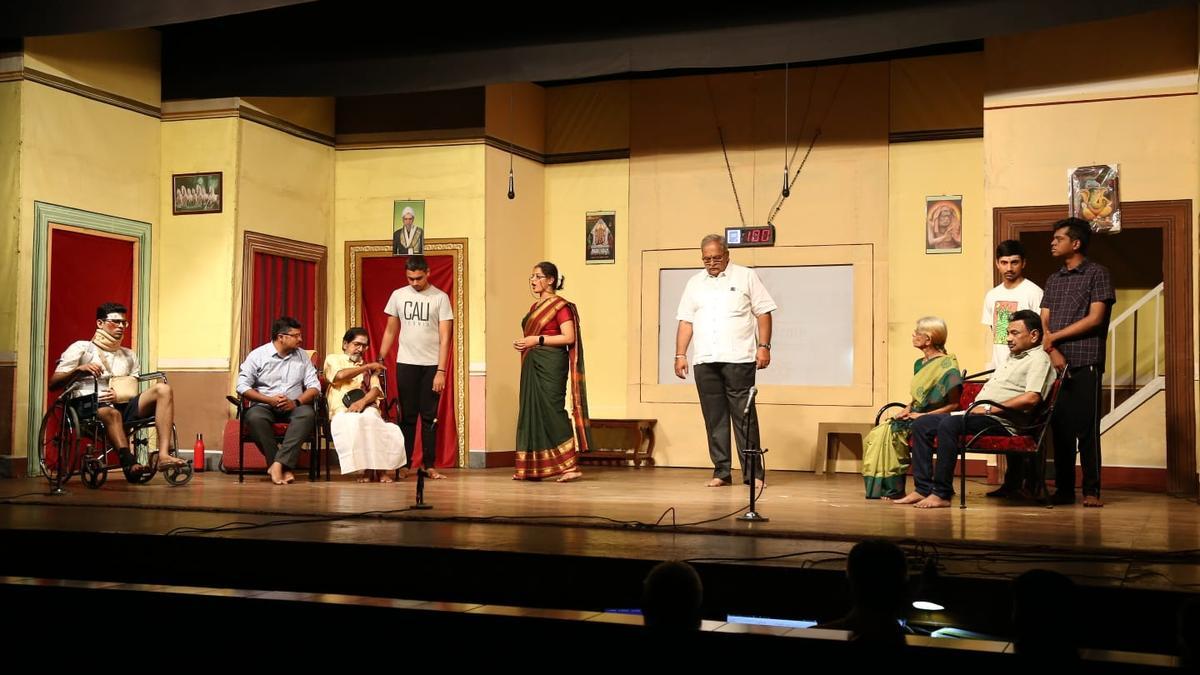
Is there only one route to success — a degree in Engineering at a premier institute? And even assuming the answer is yes, what is the price one pays for this? These are among the many questions PMG Mayurapriya’s latest play Big Boss (story, dialogues, and direction by P. Muthukumaran) raises about the education scenario. The play was staged recently for Sri Thyaga Brahma Gana Sabha and has left the audience pondering over the poignant points it highlights.
Centum Sethuraman (portrayed by Ganapathy Shankar) runs an academy where only the brightest students are given admission. He subjects these students to grueling schedules and celebrates with immense pride when they achieve centum scores in their board exams. His wife Sowmya (played by Anu Suresh) tries to bring him to reason by pointing out that the world functions on the law of averages. According to her, superlative students are rare, as are the ones who score very poorly. Most students fall in between and can improve their scores with the right kind of help. However, Sethuraman remains entrenched in his centum fixation.
His former teacher, Shivasubramaniam (played by V.P.S. Shriraman), reminds Sethuraman that he himself was never an outstanding student but managed to succeed nevertheless. He emphasizes that helping a brilliant student score centum is not a great achievement, as such students merely need a nudge. The real challenge and fulfillment come from assisting an average student in improving their performance. Despite this compelling argument, Sethuraman initially ignores Shivasubramaniam’s advice.
The narrative takes a turning point with the death of Shivasubramaniam, which acts as a catalyst for a change of heart in Sethuraman.
. Realizing the importance of reaching out to average and underprivileged students, Sethuraman decides to take on the challenge of teaching the son of a laborer and an unruly boy notorious for playing truant.
This shift in Sethuraman’s approach brings to light the core message of the play: that success is not confined to mere numerical scores and that educators should aim to uplift and support all students, regardless of their academic standing.
The play’s title Big Boss is metaphorically reflected when four students are made to stay in Sethuraman’s house, cut off from the outside world to focus on their exam preparations. The successful exam results become a credit to Sethuraman, earning him the ‘Big Boss’ title, akin to the participants sequestered in the popular TV show of the same name. However, this portion of the narrative appeared somewhat contrived, designed to justify the titular reference rather than adding substantial value to the storyline.
Despite some room for improvement, notably in the form of pruning certain dialogues to make the script more taut, the play stands out for its well-written dialogues and meaningful content. The set was appropriately minimalistic, aiding rather than distracting from the play’s central themes.
The performances were commendable, with S. Aditya, G. Shiva Shankar, Dhiraj C. Mohan, and S. Ananth, who played the students, bringing energy and authenticity to their roles. The collective efforts of the cast and crew were acknowledged when the play won the Best Play award along with four other awards at the Kodai Nataka Vizha of Kartik Fine Arts this year. The newly instituted rolling trophy by Ramkumar Ganesan, son of the legendary Sivaji Ganesan, will be awarded to the Mayurapriya team for their all-round performance.
Big Boss serves as an eye-opener, challenging the narrow perceptions of success fostered by the prevailing education system. It underscores the importance of nurturing each student’s potential, advocating that true achievement lies in the holistic development and inclusion of all students, especially those who are often neglected in the pursuit of academic perfection.












